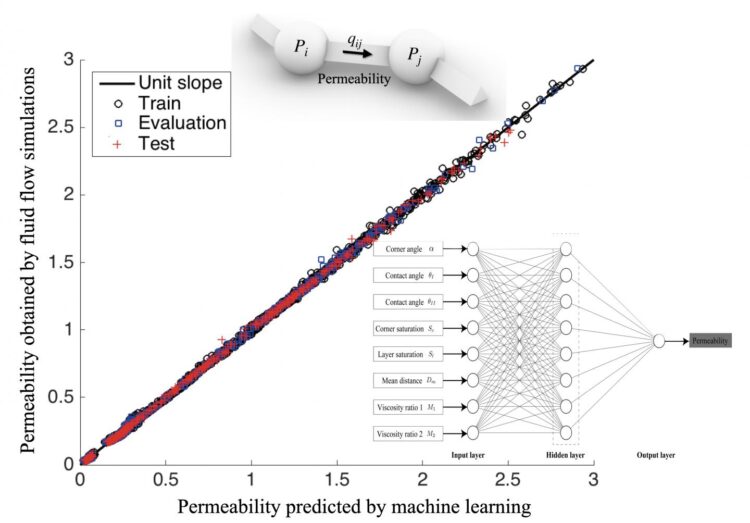Researchers led by Kyushu University find an improved way to explore key phenomena associated with multiphase fluid flow in porous materials

Credit: I2CNER, Kyushu University
Fukuoka, Japan – Many applications, including carbon dioxide storage and oil recovery, involve the simultaneous flow of two or more phases of matter (solid, liquid, gas, etc.) through porous materials. Pore-scale modeling of such multiphase flow has struggled to capture important phenomena referred to as viscous coupling effects. But now, a research team has developed a method that overcomes this limitation with potential applications to improve fuel technologies and carbon capture systems.
In a study published this month in Advances in Water Resources, researchers led by the International Institute for Carbon-Neutral Energy Research (WPI-I2CNER) at Kyushu University present a way to incorporate viscous coupling effects into pore-scale modeling of multiphase flow.
A common technique for studying such multiphase flow is pore network modeling (PNM), whereby simplified transport equations are solved for idealized pore geometries. PNM can be used to quickly estimate transport properties, but it neglects viscous coupling effects. An alternative approach is the lattice Boltzmann method (LBM), whereby equations governing fluid flow are solved for realistic pore geometries. Although the LBM can capture viscous coupling effects, it is extremely computationally inefficient.
The team behind this latest research had the idea to combine these two techniques. “We devised an improved model for PNM that uses data collected from LBM simulations,” explains co-author of the study Takeshi Tsuji. “In the simulations, we examined multiphase flow at the pore scale for a wide range of geometric parameters and viscosity ratios.”
The researchers found that for some configurations, viscous coupling effects significantly influence multiphase flow in the pore throat. They used the simulation results to derive a modification factor, expressed as a function of viscosity ratios, that can be easily incorporated into PNM to account for viscous coupling effects. The team also developed a machine learning-based method to estimate the permeability associated with multiphase flow.
“We trained an artificial neural network using a database built from the results of simulations. These simulations considered different combinations of geometric parameters, viscosity ratios, and so on,” says lead author Fei Jiang. “We found that the trained neural network can predict the multiphase permeability with extremely high accuracy.”
This new data-driven approach not only improves PNM by including detailed pore-scale information, but it maintains good computational efficiency. Given that multiphase flow through porous materials is central to many natural and industrial processes, studies such as this one could have far-reaching implications.
###
The article, “Investigation of viscous coupling effects in three-phase flow by lattice Boltzmann direct simulation and machine learning technique,” was published in Advances in Water Resources at DOI: 10.1016/j.advwatres.2020.103797
Media Contact
Tomoya Koga
[email protected]
Related Journal Article
http://dx.





